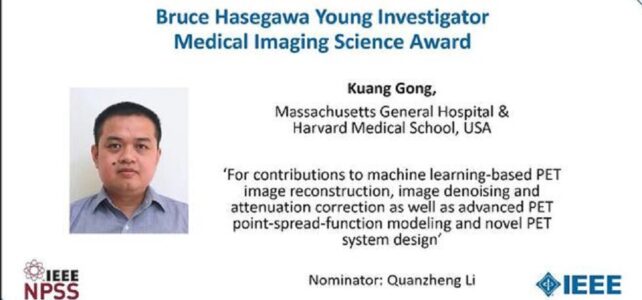Are you encountering challenges when using 2D Cardiac MR slices for 3D Cardiac analysis? Here are two major hurdles: 1. Slice thickness (usually 8-10mm) results in missing data between neighboring slices.2. Misalignment between slices due to motion. These issues impact
CAMCA’s Xiang Li and Quanzheng Li Recipient for Google Research Scholar Program!
Thrilled to share that Xiang Li and Quanzheng Li have been selected as a recipient for the prestigious Google Research Scholar Program! This recognition highlights our commitment to advancing healthcare through innovative research. Grateful for the opportunity and excited to
CAMCA Paper Published in the American Association of Physicists in Medicine
Our latest study “Estimate and compensate head motion in non-contrast head CT scans using partial angle reconstruction and deep learning” led by Zhennong Chen and Dufan Wu takes on the challenge of imperfections in head motion artifacts in head CT!
CAMCA’S Xiang Li Received MGH Thrall Innovation Grants Award
CAMCA Researcher Xiang Li received the 2021 MGH Thrall Innovation Grants Award. The award will fund Dr. Li’s research of lung cancer screening by transformed chest X-ray imaging, entitled “Chest Radiographs-based Lung Cancer Screening by the DeepProjection Technique”.
CAMCA’S Kuang Gong Wins Young Investigator Award

CAMCA Reseacher Kuang Gong received 2021 The Bruce Hasegawa Young Investigator Medical Imaging Science Award from The Institute of Electrical and Electronics Engineers’ Nuclear & Plasma Sciences Society (IEEE NPSS).
CAMCA Paper Published in Nature Medicine
CAMCA paper “Federated learning for predicting clinical outcomes in patients with COVID-19” has now been published in Nature Medicine!
Last year, during the COVID19 pandemic, CAMCA researchers developed a deep learning model named CO-RISK which takes both chest X-ray images and EHR data to predict the level of supplemental oxygen a patient with COVID-19 symptoms may need 24 and 72 hours after arriving at the emergency department.
CAMCA’s “Multimodal Learning and Fusion Across Scales for Clinical Decision Support” (ML-CDS 2021) was successfully held as a MICCAI satellite event
CAMCA’s “Multimodal Learning and Fusion Across Scales for Clinical Decision Support” was successfully held as a MICCAI satellite event this year, hosted at the MICCAI official virtual platform. We received 16 submissions with 10 papers accepted for oral presentation in the workshop, and more than 80 participants registered for the workshop.
Our Group Won Second Place in ISBI’s 2020 Best Paper Award!

The IEEE International Symposium on Biomedical Imaging (ISBI) is a scientific conference dedicated to mathematical, algorithmic, and computational aspects of biological and biomedical imaging, across all scales of observation. It fosters knowledge transfer among different imaging communities and contributes to an integrative approach to biomedical imaging. ISBI is a joint initiative from the IEEE Signal Processing Society (SPS) and the IEEE Engineering in Medicine and Biology Society (EMBS).
CAMCA’S Dr.Quanzheng Li is invited as Featured Speaker at World Innovation Forum 2018
The World Medical Innovation Forum is a global gathering of more than 1,000 senior health care leaders hosted by Partners HealthCare in the heart of Boston. It was established to respond to the intensifying transformation of health care and its impact on innovation. The Forum is rooted in the belief that no matter the magnitude of that change, the center of health care needs to be a shared, fundamental commitment to collaborative innovation – industry and academia working together and its ability to improve patient lives – The World Innovation Forum.
Dr.Quanzheng Li is invited as Featured Speaker at World Innovation Forum 2018
The World Medical Innovation Forum is a global gathering of more than 1,000 senior health care leaders hosted by Partners HealthCare in the heart of Boston. It was established to respond to the intensifying transformation of health care and its impact on innovation. The Forum is rooted in the belief that no matter the magnitude of that change, the center of health care needs to be a shared, fundamental commitment to collaborative innovation – industry and academia working together and its ability to improve patient lives – The World Innovation Forum.